‘Christmas Greeting From Home’ touched lives of German-American troops in WWII
The Walz family copy of the WWII-era record Christmas Greeting From Home. (Anthony C. Hayes)
In the winter of 1943, with America fighting a worldwide war, concerned citizens, civic organizations, and religious congregations throughout the U.S. were busy on the home front offering service men and women whatever support they could. Be it knitting socks and sweaters for an ever-expanding enlistment pool, staging community scrap drives, staffing USO and Red Cross stations, or writing V-letters from home, average Americans reached across the street and around the globe in a unified effort to help bring the war to an end.
Zion Church of Baltimore – like so many other houses of worship – added a special spiritual element to its important earthly endeavors. One component of those endeavors has reemerged in the way of a vintage 78 r.p.m. record which was recently donated to the church.
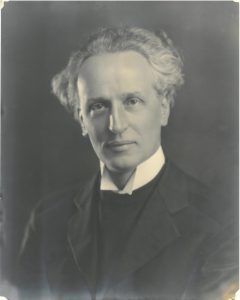
Titled Christmas Greeting From Home, the single-sided RCA record was distributed to church members who were then serving in the armed forces. Running about 3 minutes and 30 seconds in length, then-Pastor Fritz Otto Evers, along with the Zion Church choir, may be heard on the scratchy 78 offering uplifting words of faith, hope, and love. And though the existence of Christmas Greeting From Home has been known to present-day parishioners for some time, the vintage copy may have traveled with its owner to the South Pacific.
“The donor of the record was Dorothy Walz,” explained Pastor Anke Deibler. “The record had been sent to her husband, who was serving at the time. I can’t remember where, but I believe he was still on U.S. soil (when he received the record.)
“It was to encourage these soldiers at a trying time that Pastor Evers sent his Christmas message. I think it was a very caring thing to do. The fact that the Walz Family hung on to the record for all these years indicates how meaningful this gesture was to them, but Mrs. Walz now thought it should be kept at Zion. ”
Hans George Walz was the original recipient of the Walz family copy of the Christmas message.
Walz, a Baltimore Polytechnic Institute alumni, joined the Navy shortly after his graduation in 1943. After serving his country in the South Pacific, Walz returned to Baltimore, where he raised a family and spent his working life in the lumber and manufacturing businesses.
Walz passed away in 2005.
Evers was Pastor at Zion Church from 1929 – 1952. Those who remember him describe Evers as a handsome man with a sometimes difficult to understand German accent.
Evers passed away in 1963 and is interred at Lorraine Park Cemetery.
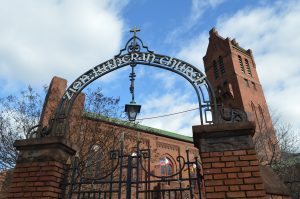
The fact that Evers spoke with a strong German accent is important to the story, not only when one listens to the recording, but when one considers the time and the place in which the message was given.
“The Second World War was very difficult emotionally for members of Zion,” said Deibler. “At the time, Zion was an all-German-speaking congregation.”
“Their loyalties lay absolutely firmly with the United States, yet all the members had deep German roots and many had family members in Germany. This emotional challenge came on top of the strain of being separated from family and potentially sent into dangerous battlefields that all troops were facing.”
“Those were dark days for Zion,” noted longtime member Bernard Penner. “The members knew they were being watched (by the FBI), but they had many sons and daughters who were in the service. So, they did the kinds of things a lot of other churches were doing to aid the war effort.”
A history of the church states that, as with the First World War, “Germany was again the enemy, and many younger immigrants had to go through the same hardships and pain which a generation before had had to endure. One hundred and fifteen men and four women of Zion answered the call to the colors. A special committee ministered to these servicemen and women in a spiritual as well as material way throughout their service. Five of the heroes did not return from the battlefield and the seas:
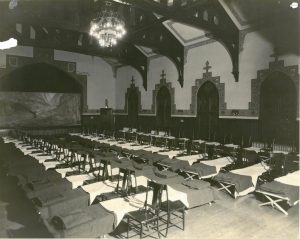
Paul H. Frese, Jr.
Herbert B.W. Lorenz
George Henry Schottler
William Velten
Gerhard Weidner
The church history continues: “At the home front, the congregation concentrated on the war effort. Unforgotten is the day in May 1942, when Pastor Fritz O. Evers on behalf of Zion Church committed the ambulance ‘The Pioneer’ to the hands of the American Red Cross… The gift was accompanied by a considerable check for the purchase of blankets. As during the First World War, the Parish House was again opened to servicemen on furlough, on all weekends, for lodging and a breakfast on Sunday morning. More than 15,000 men were accommodated from 1942 until 1945.
“Every Wednesday the ‘Zion Church Group working for the American Red Cross,’ composed of many women, met to sew and knit for the soldiers. The regular work of the congregation was not impaired by these additional activities. All these challenges resulted only in a firmer union and closer understanding among the members.”
“In the end,” observed Penner, “they were just trying to be good Americans.”
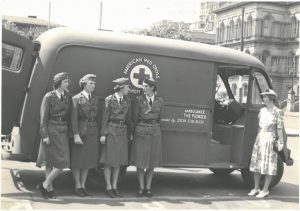
“The neat thing about the recording,” Penner added, “is you know it was done at the church because of the distinctive sound of our clarion bells. As far as the archives, there just wasn’t the impetus in those days to archive things the way we do today, so filling in the blanks about the actual recording and to who and where the records were sent can be difficult.”
Mark Duerr – another longtime member of Zion – became fascinated with the recording some years ago, after finding a pristine copy in the back of a church office desk.
“I was cleaning out the desk and reached way into the back of a drawer when I felt the heavy paper sleeve. It may have been there for decades – who knows? The copy I have in my possession is a much cleaner copy than the one the Walz family donated, but then the Walz copy literally went through the war. I had a professional engineer send me an MP3 of my copy. To tell you the truth, it’s not a great recording and can be very difficult to understand. I find when you turn the treble up and the base way down, it’s a little easier to get what Pastor Evers is saying.
“Still, I think it’s pretty amazing that this recording exists.
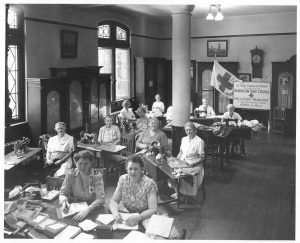
“The members at the time knew that FBI agents were regularly attending services at Zion, as well as watching the German clubs around town. Of course, the German community – and to a lesser extent the Italians – did not have it anywhere near as bad as Japanese-Americans, who lost everything when they were interred in those camps. But given the number of members who enlisted – somewhere over 100 I believe – and the things this church did – from turning our parish house into a bunkhouse for visiting servicemen, to donating an ambulance to the Red Cross – I think we demonstrated our desire to defeat Hitler and the Nazis as quickly as possible.”
Duerr said other copies of the recording are known to exist, but to the best of his knowledge, no one knows how many of the records were made, or if they were sent overseas as V-Mail or remained stateside.
“It would be hard to nail down specifics because most, if not all of the people from that era, are dead,” said Duerr.
One fact about the Walz copy may be gleaned from an inscription on the label which reads:
Property of Hans George Walz
F3C
Sampson, NY
The “Sampson, NY” part was what immediately grabbed this reporter’s attention. For a time as a boy, I wore a tee-shirt with a logo which read:
Sampson Air Force Base
The tee-shirt was a souvenir which belonged to my father, Larry Hayes, who had taken his basic training at Sampson in the 1950s. I rescued it one day from the mothballs of his old footlocker and wore the shirt until I finally wore it out.
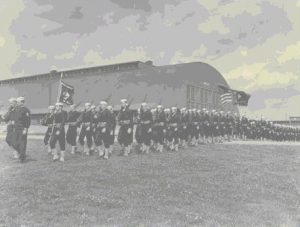
But Walz was in the Navy. Why would he have been at Sampson, NY in 1943?
My father explained the seeming contradiction.
“Sampson was on the east side of Lake Seneca. During World War II, it was a Naval training station. The Navy closed the base after the war was over, but the government re-opened it as Sampson Air Force Base at the start of the Korean War.”
Dad recalled the base as antiquated and a miserable place for young servicemen.
“It was bitter cold in the barracks, with the wind coming over the lake. That’s the reason we were issued those heavy, wool overcoats. Men were constantly getting sick with what we came to refer to as ‘Sampsonitus.’ One friend of mine got so sick that, when I went to visit him in the base hospital, they wouldn’t let me in to see him. I later learned that he had contracted tuberculosis.”
If Sampson was as woeful a place in 1943, as it was more than a decade later when my father took his basic training there, then that could well explain why Walz held onto the heartfelt “Christmas Greeting From Home” for the rest of his life.
As for the question of how many records were distributed and where did they go, it might be apt to consider that more than 411,000 recruits were trained at Sampson during WWII. Who knows how many had a chance to hear Walz’s copy that Christmas, or could have listened to it as the earnest Baltimorean served his country in the South Pacific for the remainder of the war?
The recording (see audio link below) opens with the slowly building sound of Zion’s clarion bells. Several seconds into the record, Pastor Evers begins to speak:
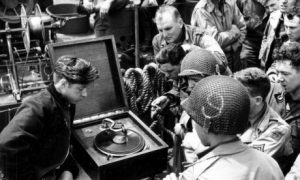
“We welcome you, Friends, with Christmas Greetings From Home. If you were here today, you would sing with us and join in our mighty hymn of faith.”
(The choir then sings an English version of the creedal anthem Glaubenslied)
Evers continues:
“Every Sunday you sang this in Sunday School and Church.
“The great story of Christmas, and the birth of the Savior, is easily familiar to you. Your faith may have wavered as you grew up and had to face the most serious aspects of life. But today, you are once more united with us in one faith and one brotherhood. The Father in heaven gave us his Son, that we might have everlasting life.
“That is our eternal joy – our undying hope.”
(Choir fades in singing Silent Night)
Evers again speaks:
“We at home here hold you in our dearest thoughts and our dearest prayers. We long for you, as you long for home in these days. Yet, we know you will be in our Heavenly Father’s keeping.
“Wherever you are, there He is also.
“May He be your guide and your strength.
“May He give you courage and fill your soul with a firm will to give your best at all times.
“May He bring you home to us, unharmed and full in body.
“May He speed the day when His peace shall reign over all the earth.
“A blessed Christmas to you, our boys and girls, from old Zion.
“We love you more than we ever did before.”
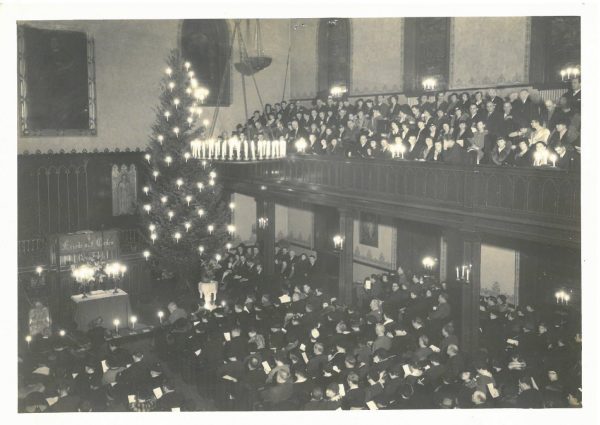

Anthony C. Hayes is an actor, author, raconteur, rapscallion and bon vivant. A one-time newsboy for the Evening Sun and professional presence at the Washington Herald, Tony’s poetry, photography, humor, and prose have also been featured in Smile, Hon, You’re in Baltimore!, Destination Maryland, Magic Octopus Magazine, Los Angeles Post-Examiner, Voice of Baltimore, SmartCEO, Alvarez Fiction, and Tales of Blood and Roses. If you notice that his work has been purloined, please let him know. As the Good Book says, “Thou shalt not steal.”
